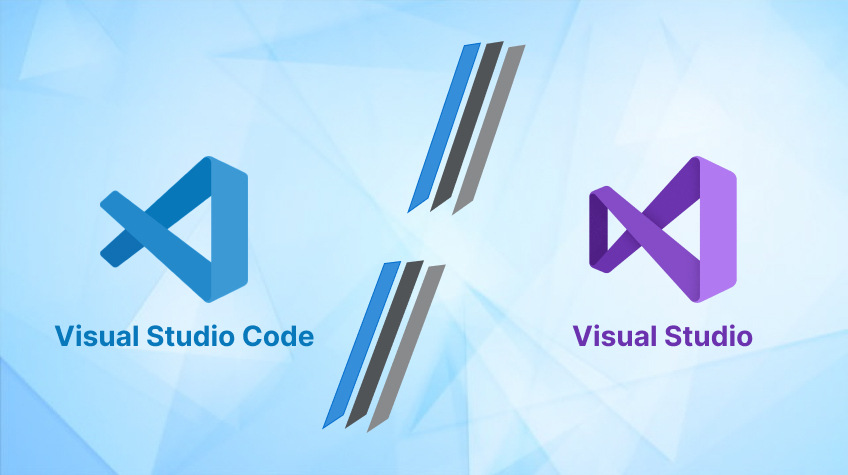
Two popular options stand out regarding code editors: Visual Studio Code (VS Code) and Visual Studio. It’s like comparing an agile, open-source athlete to a robust, feature-packed veteran. With its sleek design and extensibility, VS Code attracts a diverse crowd, from web developers to enthusiasts looking to customize their coding experience.
On the other hand, Visual Studio stands tall as a full-fledged IDE, flexing its muscles in various development domains and providing powerful tools and seamless integration with Microsoft technologies. So, whether you seek the agility of a spirited companion or the strength of a seasoned companion, the choice between VS Code and Visual Studio lies in your coding journey’s unique landscape. In this blog, we go through a comparison between Visual Studio Code (VS Code ) Vs. Visual Studios.
What is Visual Studio
Visual Studio is like a trusted companion accompanying developers on their coding adventures. It’s an all-encompassing Integrated Development Environment (IDE) that offers a robust and feature-rich platform for building applications across multiple domains. With Visual Studio, developers dive into a world of limitless possibilities, equipped with a wide array of tools, advanced debugging capabilities, and seamless integration with Microsoft technologies.
From crafting desktop applications to exploring the realms of cloud, mobile, and game development, Visual Studio stands as a dependable partner, empowering programmers to bring their creative visions to life. It’s where innovation meets craftsmanship, where ideas become a reality with the aid of a steadfast ally.
What is Visual Studio Code
Visual Studio Code (VS Code) is like a sleek and nimble companion accompanying developers on their coding expeditions. It’s a versatile and lightweight code editor that packs a punch with its impressive feature set. The powerful customization features of Visual Studio Code cater to a wide range of developers, from web wizards to tech enthusiasts.
It offers a playground for creativity, empowering programmers to write code quickly and efficiently. Whether you’re fine-tuning a web application or exploring new frontiers in programming, Visual Studio Code is the go-to tool that combines simplicity, flexibility, and a touch of magic to enhance your coding journey.
Comparison Between Visual Studio vs Visual Studio Code
Target Audience
Regarding target audiences, Visual Studio Code (VS Code) and Visual Studio cater to different needs within the vast realm of software development. VS Code is a nimble companion tailored for web and general-purpose development. Its user-friendly interface and extensive library of extensions make it a favorite among web developers and those seeking a lightweight yet powerful code editor.
On the other hand, Visual Studio stands as a full-fledged IDE, embracing a broader audience. It encompasses various development domains, including web, desktop, mobile, game, and cloud development. With its comprehensive tooling and robust features, Visual Studio empowers developers to tackle complex projects across diverse platforms, making it the go-to choice for those seeking a complete development environment.
Open Source vs. Commercial
When it comes to the aspect of openness and cost, VS Code and Visual Studio take slightly different paths. VS Code embraces the spirit of open source, offering a free and accessible platform for developers to dive into their coding adventures without any financial burden. Its open-source architecture facilitates a vibrant community, constantly contributing to its growth and expanding its capabilities.
On the other hand, Visual Studio presents a broader range of options. Individual developers can enjoy the free Visual Studio Community edition, which provides robust features suitable for personal projects. For more advanced needs, commercial editions like Visual Studio Professional and Visual Studio Enterprise offer additional tools and functionalities but require a license.
This difference in approach allows developers to choose the right balance between cost and features, ensuring that both open-source enthusiasts and those seeking comprehensive professional tools can find their ideal development environment.
Code Editing Experience
Regarding the code editing experience, VS Code and Visual Studio offer robust tools to elevate your coding prowess. They share features such as Syntax highlighting, IntelliSense for smart code suggestions, efficient code navigation, and refactoring support for code optimization.
However, Visual Studio offers more advanced features and superior integration with Microsoft development technologies. It provides seamless collaboration with Azure cloud services, extensive debugging capabilities, and integrated support for frameworks like .NET, Xamarin, and SQL Server. These added functionalities empower developers to delve deeper into Microsoft’s ecosystem and maximize their productivity while building applications for various platforms.
So, whether you’re seeking a solid foundation for general-purpose development with VS Code or aiming for a comprehensive development experience with enhanced Microsoft integration through Visual Studio, both editors deliver the tools to refine your code with finesse.
Extensions and Plugins
Regarding extensions and plugins, VS Code and Visual Studio offer a treasure trove of options to extend and enhance their functionalities. However, VS Code shines with its vast and diverse extension marketplace, thanks to its immense popularity among developers.
The VS Code extension marketplace boasts an expansive collection of community-developed and officially supported extensions covering various languages, frameworks, and development tools. Whether you need a linter, a debugging tool, a theme, or specialized language support, chances are you’ll find it in the VS Code marketplace.
While Visual Studio also has a considerable selection of extensions, the sheer size and variety of the VS Code extension ecosystem provide developers with an extensive toolkit to personalize and optimize their coding experience.
So, whether you’re a fan of the ever-growing VS Code extension marketplace or exploring the offerings in Visual Studio, both editors empower you to tailor your development environment to suit your unique needs and preferences.
Debugging
Regarding debugging, both VS Code and Visual Studio equip developers with essential tools for troubleshooting and resolving issues in their code. However, Visual Studio takes the lead in providing more advanced debugging capabilities, particularly for specific platforms like Windows, .NET, and C++.
Visual Studio offers a robust debugging tool suite that goes beyond the basics.
With features like breakpoints, watch windows, call stacks, and step-by-step execution, developers can thoroughly analyze their code’s behavior and identify the root cause of issues. Visual Studio’s integrated debugging support for multiple languages also ensures a seamless debugging experience across various development scenarios.
While VS Code also offers debugging functionality, Visual Studio’s specialized debugging tools make it the go-to choice for developers working extensively with Windows, .NET, or C++. Its comprehensive debugging capabilities empower developers to unravel complex issues and streamline the debugging process, ensuring smoother development and faster issue resolution.
Project and Solution Management
Visual Studio takes the spotlight regarding project and solution management with its comprehensive set of features designed to handle large-scale projects. It offers project templates, solution configurations, and an array of build and deployment options, providing developers with a robust framework for organizing and managing complex codebases.
Visual Studio’s project management capabilities allow developers to efficiently navigate through multiple files, maintain solution structures, and manage dependencies. The extensive build and deployment options streamline compiling, testing, and distributing applications.
On the other hand, VS Code embraces a more lightweight approach, making it an excellent choice for smaller projects or as a code editor within a larger development ecosystem. It offers a minimalistic yet flexible environment, focusing on simplicity and speed.
Ultimately, the choice between Visual Studio and VS Code depends on the scale and complexity of your projects. If you’re working on substantial endeavors that require extensive project and solution management, Visual Studio’s robust capabilities will be your ally. VS Code is a nimble and versatile companion for smaller-scale projects or a lightweight code editing experience.
Integrated Tools
Visual Studio and VS Code offer distinct approaches to integrated tools. Visual Studio stands out with its deep integration into the Microsoft development ecosystem. It seamlessly connects with various tools and frameworks, including Azure, .NET, Xamarin, and SQL Server. This integration empowers developers with dedicated tools and features tailored to those technologies, providing a cohesive and efficient development experience.
On the other hand, VS Code offers flexibility to work with various languages and frameworks, making it a versatile choice for developers across different ecosystems. While it may require additional setup or extensions for specific integrations, the extensibility of VS Code allows developers to customize their environment to suit their needs.
Whether you seek the integrated synergy of Visual Studio with Microsoft technologies or the flexibility of VS Code in a multi-language environment, both editors offer valuable options to streamline your development workflow and align with your preferred toolset.
Performance and Resource Usage
VS Code and Visual Studio follow different trajectories regarding performance and resource usage. VS Code has gained recognition for its lightweight nature, delivering swift startup times and efficient resource utilization. This makes it an excellent choice for quick code editing, smaller projects, or scenarios where system resources are limited.
In contrast, with its extensive feature set and comprehensive IDE capabilities, Visual Studio may require comparatively more system resources and have slightly longer startup times. However, it’s additional functionalities and powerful tools justify these trade-offs, making it a preferred option for complex and large-scale projects.
Ultimately, the choice between VS Code and Visual Studio depends on your project’s scale, resource availability, and the desired balance between lightweight efficiency and comprehensive features.
In conclusion, both Visual Studio Code (VS Code) and Visual Studio have their own strengths, serving different purposes within the coding landscape. VS Code shines with its lightweight nature, extensive extension marketplace, and agility for web and general-purpose development.
On the other hand, Visual Studio offers a comprehensive IDE experience with advanced debugging capabilities, robust project management features, and seamless integration with Microsoft technologies. Ultimately, the choice depends on your requirements, project size, and preference for integrated tooling. Whichever path you choose, both editors stand as reliable companions, ready to accompany you on your coding journey. We hope this blog on comparison between Visual Studio Code (VS Code) Vs. Visual Studio is useful to the readers.






